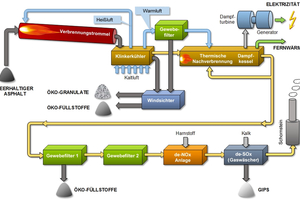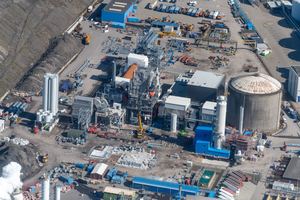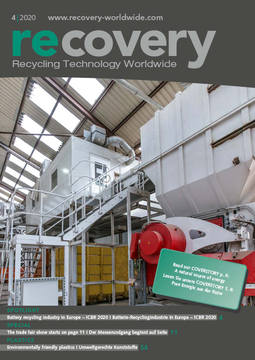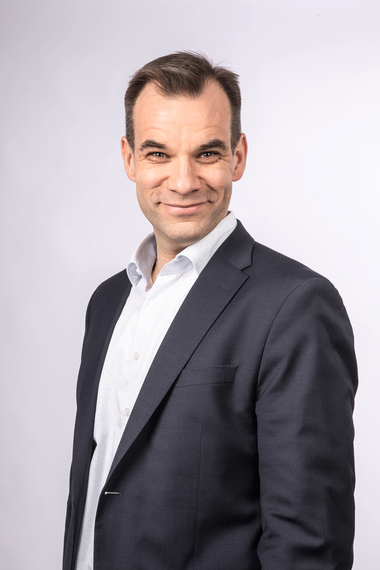Thermal cleaning plants by REKO B.V.
Every year, the renovation of the road network generates millions of tons of tar-containing road construction material. In the Netherlands alone, the figure is around 1.1 million t/h, in Germany many times of that amount. Tar-containing as asphalt is a waste material. The binder in this material contains carcinogenic polycyclic aromatic hydrocarbons (PAHs). Due to this tar contaminated road construction material may no longer be reused in road construction since 2018, according to the German Federal Ministry of Transport (BMVI), but must be deposited as a contaminated material in a landfill or sent for environmentally friendly recycling by thermal treatment in order to destroy the toxic substances they contain. In this process, granulate and sand is remaining as a high quality recycled building material. However, there are no such plants in Germany for the processing of tar-containing road construction materials. Therefore, considerable quantities from Germany are already being processed in the REKO plant in Rotterdam today. For this purpose, the road construction material is transported by inland vessel to the port of Rotterdam.
Urban mining as government policy
Due to its geological conditions, the Netherlands have only very small quantities of mineable gravel and sand resources. Every year, about 25 million t of primary raw materials such as sand and gravel must therefore be imported from Belgium, Germany, Norway and Ireland. The mining of primary raw materials causes environmental damage if demand continues to rise and leads to a shortage of primary building materials in the medium term. For this reason, the Dutch government has given the recycling of mineral waste top priority for many years. There is a landfill ban and strict regulations on the use of recycled construction materials from mineral waste, e.g. in road construction. The Netherlands therefore have many years of experience in the recycling of mineral waste and the thermal treatment of tar-containing road construction materials. Currently, about 99 % of all construction waste in the Netherlands is recycled. Urban mining is therefore a major political and economic issue.
All the more interesting is the thermal treatment of tar contaminated road construction material from Germany, as the secondary raw materials generated by this process remain in the country and can be used as substitute construction materials, being absolutely equivalent to primary raw materials. The high-quality recycled construction materials obtained by the urban mining process replace locally scarce primary resources such as sand, gravel and filling material, e.g. in asphalt or concrete mixers. Rotterdam is a recycling hotspot here.
Innovative recycling process with high
efficiency
Recycling Kombinatie REKO B.V. (REKO) started operation its first thermal cleaning plant for tar-containing oad construction materials in 2006. The road construction material is first crushed. The tar with its toxic, organic components such as PAK is then incinerated at a temperature of approx. 850 to 1000 degrees Celsius and thus completely destroyed. What remains is the mineral content (sand/gravel/filler) as a high-quality secondary building material. A further ecological benefit is the use of the residual heat for electricity production. The hot flue gases are used to produce steam. This drives a steam turbine and a generator to produce electricity. This enables the existing REKO I plant to generate around 5 MW of electricity per hour. Enough to supply approx. 9000 families with electricity.
After cooling, the flue gases are cleaned in several stages. First they are dedusted by two bag-house filters. The dust is used in the concrete or asphalt industry as an eco-filler. The nitrogen oxide in the flue gases is then converted into harmless nitrogen and oxygen by a catalytic DeNOx plant. In a DeSOx plant (gas scrubber), the flue gases are then cleaned of sulphur oxide, which was produced by the combustion of sulphur, which was a component of tar in high concentrations. By washing the gases with lime water, the sulphur oxide is converted into synthetic gypsum in a chemical reaction. This gypsum is suitable for high-quality applications in the construction industry. Finally, only water vapour escapes from the chimney of the plant, leaving no pollutants whatsoever. This results in a recycling rate of 100 % of the source materials.
Growing demand for thermal cleaning in Europe
A study by REKO B.V. had shown that in the past large quantities of tar-containing asphalt were produced everywhere in Europe (Germany, Belgium, France, Austria, Switzerland), which up to now have largely been deposited in a landfill due to the lack of alternatives. For this reason, REKO B.V. decided to build a second state-of-the-art thermal cleaning plant. This new plant („REKO II“) with an investment volume of approx. 125 million € is already under construction and is scheduled for completion in 2020. It will have a cleaning capacity of 1.2 million tons per year. Compared to the first plant („REKO I“) from 2006, it is many times more energy-efficient and sustainable.
On the one hand, natural gas can already be saved during the combustion process. Innovative flue gas recirculation reduces the total amount of flue gas. This saves electricity for fans and gas scrubbers. A modern air classifier system allows the separated dust to be separated more precisely according to particle size. The concrete industry can save on cement because it receives higher quality dust and granulates. Particularly impressive is the rate of increase in energy production of 400 %. Thus, a multiple of energy can be generated from the process residual heat using the most modern plant technology. With a maximum of 28 MW/hour, the amount of electricity is sufficient to supply about 70 000 families. Alternatively, the new plant offers the possibility of feeding the waste heat obtained (e.g. in winter or in the morning) directly into the district heating network of Rotterdam in order to heat homes and greenhouses in an environmentally friendly way.
In addition to the secondary raw materials produced, 400 % more energy can be generated than the fuel (natural gas) used for operation. In this way REKO B.V. makes a decisive contribution to an environmentally friendly circular economy and to the reduction of CO2 emissions in the building materials industry in Europe. If the demand for thermal cleaning of tar-containing asphalt in Central Europe continues to grow, REKO also plans to build a third cleaning plant in the Netherlands or in Germany in the long term.
„Investigations by the Fraunhofer Institute in 2019 have proven that our innovative systems for the thermal cleaning of tar-containing asphalt, despite the transport effort involved, not onl y offer advantages in terms of energy efficiency and environmental friendliness compared to landfill,“ explains David Heijkoop, Director of REKO B.V. „Above all, our process of energy recovery also offers considerable CO2 savings. For example, the greenhouse emissions per tonne of tar-containing asphalt shows more advantageous than landfill, even if the distance between the place of origin and the landfill is 0 kilometres. With increasing transport distances between the place of origin and the landfill site, this advantage increases continuously.“




